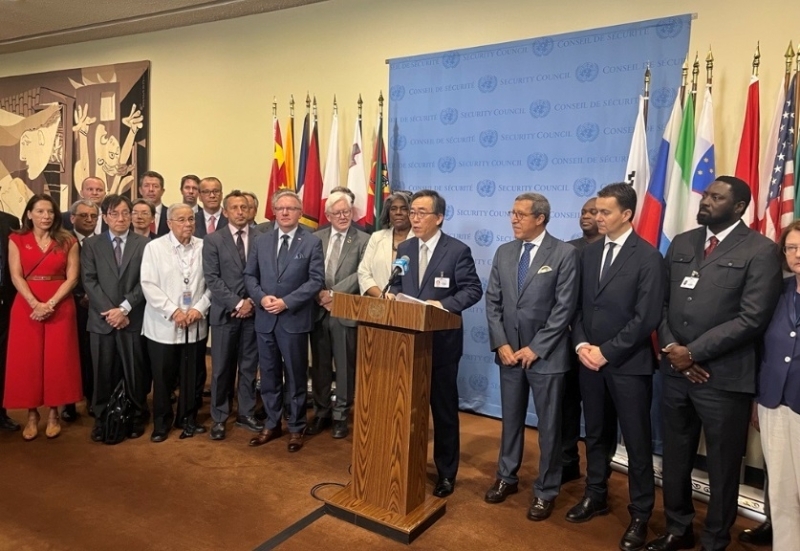国際の平和と安全の文脈における情報通信技術の使用に関する共同声明

Joint Statement on the use of Information and Communications
Technology in the context of International Peace and Security
delivered by H.E. Cho Tae-yul
Minister of Foreign Affairs Republic of Korea (June 20, 2024)
On behalf of 63 Member States (Republic of Korea, Albania, Andorra, Australia, Austria, Bahrain, Belgium, Bulgaria, Cambodia, Canada, Croatia, Cyprus, Czechia, Denmark, Ecuador, Estonia, Finland, France, Gambia, Germany, Georgia, Greece, Guyana, Hungary, Iceland, Ireland, Israel, Italy, Japan, Kiribati, Latvia, Liberia, Liechtenstein, Lithuania, Luxembourg, Malta, Marshall Islands, Montenegro, Morocco, Netherlands, New Zealand, North Macedonia, Norway, Palau, Peru, the Philippines, Poland, Portugal, Qatar, Republic of Moldova, Romania, Serbia, Sierra Leone, Slovakia, Slovenia, Spain, Sweden, Switzerland, Türkiye, Ukraine, United Arab Emirates, United Kingdom, United States) and the European Union
We take this opportunity to reaffirm our steadfast commitment to promoting an open, secure, stable, accessible and peaceful Information and Communication Technologies (ICTs) environment in compliance with international law.
We note that the malicious use of cyberspace poses significant challenge in today’s interconnected world, as states rely heavily on digital infrastructure for communication, commerce, and governance.
The cyber threat landscape is constantly evolving with the growing use of new malware and cybertechniques. The dark web and illicit revenues generated from cryptocurrency heists can be exploited to support terrorist activities and nuclear and WMD development in violation of relevant UN Security Council Resolutions and international law.
In particular, we express our deep concern over malicious cyber activities targeting critical infrastructure as they can cause cascading effects across borders and sectors including the healthcare, maritime, aviation, space, energy, and financial sectors.
We are also concerned that impacts of malicious use of ICTs may have disproportionate effects on women and children, people in vulnerable situations, and citizens of States with less capacity to address cyber threats. In this vein, capacity-building is an important aspect of cooperation in cybersecurity and the United Nations can continue to play an important role in this regard.
We note an alarming trend that malicious use of ICTs can work as threat multipliers, aggravating existing conflicts and threats against international peace and security. In this respect, the linkage of cyber threats and international peace and security is evident, and the Security Council has a key role to play in addressing cyber threats, to fulfill its primary responsibility for maintenance of international peace and security.
We express our strong view that the Security Council needs to raise its awareness and deepen understanding of the ever-evolving threat landscape in cyberspace. The Council could benefit from convening meetings and receiving regular briefings on the evolving threat landscape in cyberspace in conjunction with its mandate and agenda.
We believe that comprehensive, responsive, and evidence-based approach to cybersecurity in line with the works and mandate of the Security Council is essential for the Council to remain agile and relevant in light of the rapidly evolving technology. Bearing in mind the nexus between cybersecurity and the existing mandate of the Council, the Council could explore ways to mainstream cyber concerns when discussing country-specific files or other thematic files.
We are of the view that the role and work of the Council in cybersecurity must reinforce and complement the existing and ongoing work of the General Assembly. In this respect, we also recognize the importance of the Council’s reaffirmation of the UN framework of responsible State behavior in the use of ICTs which was adopted by consensus of all United Nations Member States.
With this in mind, we welcome today’s Open Debate in the Security Council, which gives opportunity for the Member States to initiate relevant discussion and present their views on the possible role of the Security Council in addressing the malicious use of ICTs.
